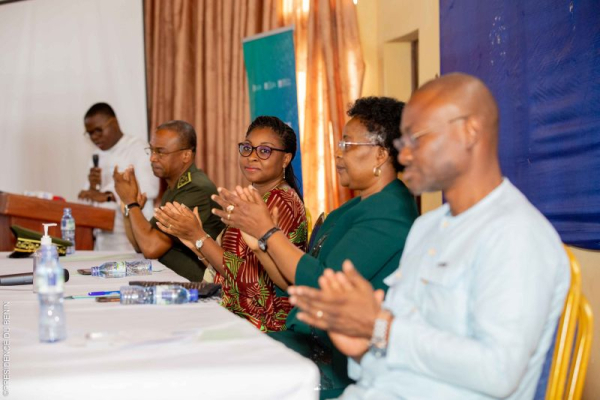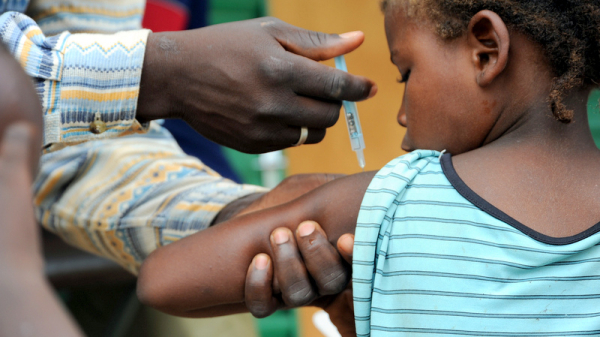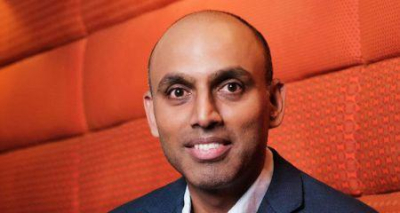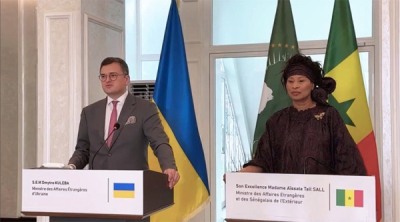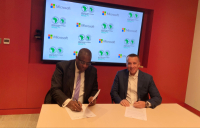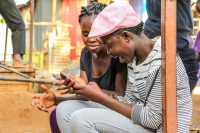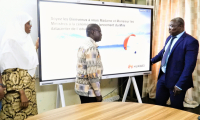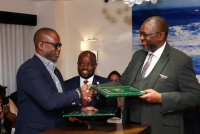
Tech (802)
The project aims to, eventually, interconnect all of Benin's universities and research centers with regional and international networks.
In Benin, ten universities and academic centers can now communicate, exchange, and share educational resources through the Beninese Education and Research Network (RBER). The network was officially launched at the University of Parakou last Thursday, October 6.
According to the country’s Minister of Digital Transformation, Aurelie Adam Soule Zoumarou (photo, center), the RBER is now the largest fixed network in Benin. "The RBER is not just about the Internet. It is first of all a network that interconnects universities, allows the exchange of digital and educational resources, and enables users to move from one university [or academic center] to the other and enjoy the same services,” she said.
After the disruptions caused by the coronavirus pandemic during the academic year, the Beninese government decided to create a system that will facilitate access to information for more than 100,000 Beninese students with a broadband Internet connection, documentation, and online courses.
The first phase of the project was launched on June 30, 2022. Among other things, it enabled the construction of a campus network of 420 access points in lecture halls, laboratories, and offices. It also enabled the construction of two videoconferencing and IP telephony systems, the installation of a 1000 Mbps Internet network, and the deployment of 7,000 meters of optical fiber. The second phase of the project will integrate new services and add 12 universities to the interconnected network.
This first phase, which has just been completed, was implemented by the national information technology development agency (ASIN), under the supervision of the Ministry of Digitization. Active participants included the Ministry of Higher Education and Scientific Research stakeholders and universities.
The establishment of the Beninese Education and Research Network is in line with the government’s strategy to make the country an ICT leader in West Africa by digitizing every socio-economic sector.
Samira Njoya
In sub-Saharan Africa, the fight against infectious diseases is a major public health challenge. Vaccination remains one of the most effective weapons to fight these diseases and protect public health.
Japan recently contributed US$1.5 million to UNICEF to improve care for unimmunized and under-immunized children “at community level” in Uganda.
According to a UNICEF release dated October 5, 2022, the funds will be used to “roll out a digital health information system that will help reach unimmunized and under-immunized children with required vaccines, and those targeted for COVID-19 vaccination; assist health workers to plan for vaccination supplies, and track COVID-19 vaccination.”
In Uganda, the Ministry of Health faces several challenges including the lack of an accurate or near-accurate source of the actual number of children who have not received their doses of vaccine, the complexity of data collection forms, and the lack of a simplified way to view the status of supplies.
For the UNICEF Representative to Uganda, Munir Safieldin (Phd.), thanks to the planned platform, “the Ugandan government [...] will be able to better manage routine and supplementary immunization, COVID-19 vaccination, vitamin A supplementation, deworming and community nutrition screening data.”
The two-year project will directly benefit 350 health workers and 60 staff from the Ministry of Health and regional hospitals. It will also indirectly benefit 1.3 million children under five in the pilot districts of Kamuli, Kampala, Kamwenge, Lamwo, Mukono, Ntungamo, and Wakiso. “The intervention will also benefit 10 million under-five children at the national level and 21 million vaccinated children aged 12-18 years that will be vaccinated against COVID-19,” the UNICEF release informs.
The funding comes just weeks after the eighth Tokyo International Conference on African Development (TICAD8) held in August 2022. During the conference, Japan renewed its commitment to working on Covid-19 countermeasures, promoting universal health coverage, strengthening health and medical systems, and building better health security.
Samira Njoya
South Africa is the largest cloud market in Africa. The rainbow nation is home to the facilities of some of the biggest companies in the industry, including Microsoft, Amazon, Oracle, Huawei, Acronis, and now Google.
U.S. tech giant Google announced on Wednesday, Oct. 5, the launch of its first African cloud region in South Africa to provide cloud computing services to businesses. In South Africa, Google will compete with Amazon and Microsoft, which are already well-established in the cloud market.
The tech giant also plans to build cloud interconnection sites in Cape Town, Johannesburg, Lagos, and Nairobi and feed them with its Equiano subsea cable. According to Niral Patel (photo), director of Google Cloud Africa, the new region and interconnection sites will bring cloud services closer to customers, allowing them to choose where to “consume cloud services.”
The initiative is part of Google's plan to invest US$1 billion in the continent. It chose South Africa due to the high demand for cloud services and the market potential, we learn. According to Research and Markets’ "Africa Data Center Market - Industry Outlook & Forecast 2022-2027" report, in South Africa, cloud adoption is expected to grow by 25 percent annually and generate up to US$1.5 billion by 2024.
A Google Cloud-commissioned study by AlphaBeta Economics indicates that the South African cloud region will contribute more than US$2.1 billion to South Africa's GDP and support the creation of more than 40,000 jobs by 2030.
“The new region will allow for the localization of applications and services. It will make it really easier for our customers and partners to quickly deploy solutions for their businesses, whereby they’re able to leverage our computer artificial intelligence or machine learning capabilities, and data analytics to make smarter business decisions as they go forward,” Patel said.
Isaac K. Kassouwi
Digital technologies are key components in Senegal’s development program. Therefore, to achieve its 2025 development goals, the country has agreed to collaborate with Ukraine, which aims to become the “most digital country” in the world" after the Russian invasion.
On October 3, 2022, the Ukrainian Minister of Foreign Affairs, Dmytro Kuleba (photo, left) was in Senegal, the first step in his African tour. The Ukrainian official was welcomed by his Senegalese counterpart Aissata Tall Sall (photo, right).
"As part of its African strategy, Ukraine is deepening its relations with African countries. Making the first stop of my tour in Senegal is a symbolic move as the Senegalese president is currently the chairperson of the African Union. My peer Aissata and I have agreed to open a new chapter of mutually beneficial cooperation between Ukraine and Senegal," said Dmytro Kuleba.
The two ministers discussed steps to intensify cooperation in information technology, digitalization, cybersecurity, trade, agriculture, and education. "I came to Senegal with business leaders, notably those active in the digital sector where our country is really advanced. We can be of great help to Senegal in that sector and we are ready to offer more opportunities,” Dmytro added.
In recent years, before the Russian invasion, the Ukrainian digital economy and ICT industry recorded strong growth. In 2021, Ukraine's IT exports grew 36 percent year-on-year to US$6.8 billion, representing 10 percent of the country's exports.
Like Senegal, the country also has an extensive e-government platform where users can quickly get administrative documents. The goal of its platform, dubbed diaa, is to make all public services available online. Thanks to this platform, Ukraine has become the first country to recognize e-passports and ID cards as official documents.
Senegal, which also has the same objectives as the "Digital Senegal" platform, can therefore count on this new cooperation opportunity to achieve its "Digital Senegal 2025" ambitions.
Samira Njoya
Niger has the highest fertility rate in the world. Meeting the food needs of this rapidly growing population is a challenge for the government, organizations, and actors in the agricultural sector.
Last Tuesday, the Digital Development Agency (ADN) and the Swiss Foundation for Technical Cooperation, Swisscontact, launched an integrated digital platform in Niamey. The platform, baptized AgriShop/Rayuwa, aims to improve the skills of the various actors in the agricultural ecosystem in Niger, but also to facilitate their access to agriculture data and information.
According to ADN CEO, Wahidi Rabiou, the AgriShop/Rayuwa platform has three components. They are namely an e-commerce feature to connect farmers with potential clients and fellow farmers, an assistance feature to advise farmers, and an information feature to inform and train them.
Agriculture plays a very important role in Niger's economy. According to the United Nations Office for Project Services (UNOPS), it accounts for nearly 40% of the country’s GDP and provides livelihoods to more than 80% of the rural population. However, farmers sometimes lack the right information on seed techniques. They sometimes don’t even have loyal customers to quickly sell their products.
The e-commerce feature, Agrishop, will correct these shortcomings by offering farmers the possibility to list their products for sale. It targets "cooperatives, input or seed suppliers, individual or professional buyers, agribusinesses, agritech and also farmers, transporters, and marketers,” Wahidi Rabiou explains.
The platform can be used even without an internet connection. Thanks to a dedicated USSD code, farmers can receive information and advice via SMS messages. They can also receive remote assistance.
The project also includes an interactive voice server accessible through a short code allowing users to listen to pre-recorded messages on useful information, and agricultural advice in French, Hausa, Zarma, and many other languages.
The development of this “groundbreaking” platform is part of two programs implemented by Swisscontact. The first program is the Promel (Local entrepreneurship promotion program) financed by the Swiss Cooperation and the PEMIJ (Promotion of youth employment and labor market integration) financed by the Dutch Embassy.
Samira Njoya
The 2-year program launched by Southbridge A&I and its partners aims to uncover homegrown innovations that have the potential to change the way healthcare supply chains and systems work.
On Monday, Sept. 26, Investing in Innovation Africa unveiled the list of 30 African startups selected for the first cohort of the Investing in Innovation (i3) program.
The selected startups include seven Nigerians, five Kenyans, three South Africans, three Moroccans, two Zimbabweans, two Ugandans, one Cameroonian, one Angolan, one Congolese, one Ivorian, one Ghanaian, one Rwandan, one Senegalese, and one Tunisian.
All of them are in the start-up or growth phase and offer innovative solutions for the distribution of medicines and medical equipment, stock management and financing, authentication, traceability, and medical waste management. They will each receive a US$50,000 grant and support to catalyze growth-oriented partnerships with donors, industry leaders, and institutions. Their market access will also be improved with the various events they will attend throughout the year.
According to Efosa Ojomo, member of the i3 Steering Committee, “i3’s focus on African ingenuity is long overdue – supporting locally-led, market-creating innovations to scale will equip the continent to achieve health gains, generate prosperity and weather future crises.”
Samira Njoya
Entrepreneurship is a key component of strategies aimed at addressing youth unemployment in Africa. However, entrepreneurs still face challenges in accessing financing. Several programs are ongoing to address that issue.
U.S. Tech corporation Microsoft recently strengthened its partnership with the African Development Bank (AfDB). According to the press release received by We are Tech on Monday, September 26, the objective of this new partnership is to boost young Africans’ entrepreneurship spirit. It comes after the implementation of the African Development Bank's Youth Entrepreneurship Investment Bank (YEIB) Initiative.
“The strengthening of our partnership with Microsoft on the Youth Entrepreneurship Investment Banks (YEIB) is an important development in our journey towards harnessing Africa’s demographic dividend and facilitating the creation of millions of jobs for young Africans by 2025,” said Solomon Quaynor (photo, left), the African Development Bank’s Vice President for Private Sector, Infrastructure, and Industrialization.
Africa has the youngest population in the world. According to the AfDB, the continent’s population, which is growing fast, is expected to double to over 830 million by 2050. Of the estimated 420 million young Africans aged 15-35, one-third are unemployed and discouraged, another third are in precarious employment, and only one in six has paid employment.
This collaboration, through the Microsoft Africa Transformation Office (ATO), will contribute to the development of youth entrepreneurship ecosystems, but also the creation of new jobs. It will also support digital inclusion in Africa.
“We believe much can be done to help foster youth entrepreneurship by collaborating with the African Development Bank, driving greater economic inclusion for this key segment of the population, and ultimately building a more prosperous society,” said Microsoft Africa Regional Cluster's General Manager, Wael Elkabbany (photo, right).
The partnership will also facilitate the establishment of national institutions through a public-private collaboration model that will increase technical and financial support and capacity building benefiting young entrepreneurs.
Samira Njoya
In the past 30 years, internet connectivity has been the main focus of most countries’ digital transformation programs. With the fourth industrial revolution, priorities have evolved but, many nations are still not ready.
Netherlands-based VPN services provider Surfshark recently unveiled the top 10 African countries whose digital experience improves the quality of life. According to its "2021 Digital Quality of Life Index", those countries are namely South Africa, Mauritius, Kenya, Tunisia, Nigeria, Morocco, Algeria, Ghana, Senegal, and Côte d’Ivoire.
The ten countries were ranked based on five criteria: Internet affordability, Internet quality, electronic infrastructure, e-security, and e-government. By taking action in those five segments, countries modernize public and private services, rendering them more efficient. They also improve their business environments, promote innovation, improve the dynamism of the startup ecosystem, making it more attractive for investors, encourage the population to be actively involved in the development of the digital economy, and promote human development.
Digital quality of life is still modest in those ten countries compared to the global average. Indeed, while the global average -for the 110 countries ranked- is 0.53 out of 0.90 points, the African leader -South Africa- collected just 0.49 points.
Let’s note that some countries perform best in specific index criteria. For instance, Angola, which is not in the top 10 African countries with the best digital quality of life, was the African country with the most affordable internet. Globally, it ranked 17th out of 110 countries.
Similarly, Algeria was the African country with the best internet quality (28th worldwide). Kenya took the lead in “electronic infrastructure” on the continent, coming 58th on the global stage. When it comes to e-security Nigeria was the best African country, the 46th worldwide. Finally, Mauritius has been the African country with the best e-government. In that segment, it was ranked 53rd out of 110 countries worldwide.
Muriel Edjo
Burkina Faso, like most countries, is constantly looking for innovative solutions to provide quality education to its entire population. To achieve this, the country has turned to ICTs because of the immense potential they offer.
Burkina Faso inaugurated, Tuesday (September 20), the data center of the virtual university of Burkina Faso. The data center (based in Ouagadougou) was inaugurated by ICT Minister Aminata Zerbo/Sabané (photo, left), and the Minister of Higher Education Frédéric Ouattara (photo, right).
It is a multi-task and multi-action infrastructure exclusively dedicated to education as its name (datacenter de l’éducation- datacenter for education) implies. According to Minister Aminata Zerbo/Sabané, it will help host digital resources and enable easier access to them. It will also allow the interconnection of the country's universities, and facilitate access to live classes.
"This is an important step in the integration of digital tools in higher education to improve the quality of the training offered and address the challenges faced by our universities, including overcrowding,” she said.
The data center is hosted by the National Agency for the Promotion of Information Technology and Communication (ANPTIC). It has great energy adaptation abilities and a broadband connection to facilitate access to educational resources that will be hosted.
For Minister Frédéric Ouattara, it will be useful in more ways than one, because "it will not only enable distance learning, e-classes and allow the streaming of remote or in-person classes. It will also allow demos and help deploy internet in the whole [higher education] system."
The school closure prompted by the coronavirus pandemic and the ongoing security crisis compelled Burkina Faso to place digitalization at the core of its education projects. In July 2022, 69 of its private and public university lecturers were trained in digital course scripting, design, and assessment.
The data center built with the technical support of Huawei is the first step of the innovative smart classroom project that the virtual university of Burkina Faso aims to launch soon.
Samira Njoya
In a continent, like Africa, where digital transformation is underway, health data is highly strategic. When used wisely, it can provide advanced analytics, disease modeling, and enhance various forecasts.
The African Centers for Disease Control and Prevention (Africa CDC) and the Smart Africa Alliance plan to accelerate the use of digital technologies to improve care and strengthen health systems on the continent. For that purpose, on September 19, 2022, on the sidelines of the 77th United Nations General Assembly, the two institutions signed a collaboration agreement.
The agreement focuses on connecting all of Africa's health facilities and personnel by 2030, advancing the protection, portability, interoperability, and governance of health data. Smart Africa and Africa CDC will also work with African Union member states to advance digital healthcare.
“Digital health innovation holds great potential to expand access, increase quality and reduce the cost of health services across the continent,” said Dr. Ahmed Ogwell Ouma (photo, right), acting director of Africa CDC.
During the coronavirus pandemic, in Africa where access to quality healthcare remains a challenge, digital technologies once again demonstrated their importance. The ability of those technologies to bring quality care to even remote populations and to help anticipate potential future crises makes digital health a high-value service that is urgently needed to ensure economic and social development on the continent.
Even large financial groups and foreign investors have realized the importance that digital health will play in Africa's next growth cycle. This fact is reflected in the growing volume of financial support the African healthtech has mobilized over the past four years. From US$18 million in 2018, that support rose to US$230 million in 2021, according to investment platform Partech.
For Lacina Koné (photo, left), Smart Africa's CEO, "the future of healthcare in Africa is digital-first, powered by mobility and a growing population of digital natives who demand to play a more proactive role in their health and care."
Muriel Edjo
More...
The seed funding comes a few months after the healthtech’s last fundraising operation. It will help conquer additional states in Nigeria and expand outside the country.
Nigerian healthtech startup Remedial Health announced, Tuesday (September 20), it raised US$4.4 million in seed funding. According to the startup, the funds secured will help accelerate expansion in Nigeria and provide “access to credit for inventory purchases for [its] growing customer base of neighbourhood pharmacies, Proprietary Patent Medicine Vendors (PPMVs), and hospitals in the country.”
“Neighbourhood pharmacies and PPMVs have the potential to be the face of a thriving healthcare system in Africa, and we believe that technology can play a significant role in making this vision a reality. The funds that we have raised and the strategic support from our investors will enable us to deliver the solutions to address various challenges that have hampered these businesses’ growth for many years and make it easier to safeguard lives and livelihoods across the continent for years to come,” said Samuel Okwuada, Remedial Health co-founder and CEO, in a release.
According to the World Health Organization (WHO), in Africa, counterfeit drugs cause some 100,000 deaths every year and more than 30% of medicines sold on the continent are counterfeit. Remedial Health wants to solve this problem, by offering its customers a digital procurement platform that allows pharmacies to manage their operations by making it easy to take and track orders. The startup also supports financial reporting and accounting, while providing real-time market intelligence that improves manufacturers' forecasting, production, and distribution decisions.
The healthtech startup was founded in Lagos, Nigeria, in 2009. From January 2022 to date, it has witnessed a 600 percent increase in the number of its customers and expanded its reach from six to 16 states. Thanks to the new financing raised, it plans to cover the remaining 20 states but also lay the groundwork for its African expansion by 2023.
Samira Njoya
In this interview with We Are Tech Africa, Karine Doret, Customer Experience and Digital Director for Orange Middle-East and Africa, expands on the operator’s goals with its digital customer service. She also presented the investments made by Orange to increase network coverage and increase customer satisfaction in its African markets.
Orange recently digitized its services and offers to its African clients. Why such a revolution?
With the coronavirus pandemic, new uses have emerged across the continent and our customers’ needs, uses and expectations have evolved. During the health crisis, telecommunication infrastructures proved to be more essential than ever for governments, businesses, and families. At the beginning of the crisis, we saw data traffic increase by 60% in some countries. In 2020, mobile data consumption per user almost doubled.
The digital sector offers numerous opportunities. For instance, in the education sector, MOOCs are gradually becoming the norm. Also, the use of mobile financial services continues to grow, with two-thirds of mobile money transactions worldwide taking place on the African continent (source: Financial Industry Summit 2021). Businesses are giving increased importance to remote work, which is also becoming the norm. This coronavirus-fueled acceleration of digital adoption is not slowing down. Far from that, our customers’ digital needs and expectations are rising.
At Orange Middle East and Africa, we truly believe that digital technologies can help Africa grow faster, train its youth, empower its entrepreneurs, and overcome the lack of infrastructure and transportation. Accelerating this adoption is essential to addressing the many challenges facing the continent.
As an operator, Orange must be a leader in this area. Customers expect digitalization to drive simplicity in every aspect of their lives. This is what we strive for by digitizing all of our customer paths and interactions. Cameroon is a tangible example of our efforts in that area. We have a Whatsapp chatbot that facilitates the collection of subscribers’ identification documents. The process is simple, secure, and efficient. They only need to take a picture with their smartphone. So, there is no need for them to go anywhere and waste time. Subscriber satisfaction increased by more than 100 percent in that area thanks to the simplicity of the path and almost real-time processing.
What are currently the services already digitalized by Orange and which countries are concerned?
Currently, the array of services and offers already digitalized by Orange is quite large. Let's start with our mobile applications. To date, 13.5 million subscribers use "My Orange" to easily manage their mobile and fixed lines. The free application, launched in 2016, is available for Android and iOS devices. It also has a web app. It is available in 17 countries, offering services like voice and data subscriptions, money transfers, balance checking, etc. In 2021, a new service, "My Place" service was added to the application. The service is available in eight countries and offers content (films and series, games, music, news, etc.).
We also have an Orange Money application to digitalize our subscribers' financial transactions. It is an e-wallet that allows our subscribers to transfer funds nationwide or to international parties, and pay their bills or merchants simply and securely. In several countries, we have enhanced the application with a QR code that simplifies their experience. In countries like Côte d’Ivoire, Madagascar, and Senegal, they can also subscribe to microloan offers.
In 12 countries, our subscribers can order their cellphones as well as telecom and internet accessories online. And since March 2022, Orange Cameroon has created a Business space allowing professional customers to access a catalog of dedicated offers. This e-commerce proposal is enriched with proposals of a fully-digitalized customer journey, from order to delivery, and similar assistance offers. To date, this offer is available in Jordan, with "Jood", but also in Morocco. Similar offers are planned in Egypt, Côte d’Ivoire, and Senegal.
Our digitalization effort is not limited to offers and services, we are digitizing our entire customer relationship. Bots are available in 12 African and Middle Eastern countries, namely Morocco, Jordan, Senegal, Guinea Conakry, Guinea Bissau, Ivory Coast, Cameroon, Burkina Faso, Egypt, Tunisia, Mali, and recently the Democratic Republic of Congo.
The bots are accessible on the web portal, WhatsApp, Facebook Messenger, Twitter, and in the My Orange application. Initially designed for informational purposes (checking one's offer, voice and data balance, etc.), they are now evolving towards transactional purposes (money transfers, top-ups, etc.). In Guinea, Cameroon and Jordan, in addition to customer assistance, our chatbots enable the purchase of products and services. We have also digitalized B2B offers by developing self-care tools for professional clients.
In Africa, internet penetration is around 30 percent. How is Orange planning to enable access to its digital services for everyone?
We invest nearly €1 billion in our infrastructures and networks every year. Our 2G/3G networks are deployed in all of our 17 African markets and provide connectivity to 139 million subscribers. Orange 4G is available in almost every one of our markets and over 40 million subscribers have access to this technology. We also plan to soon launch 5G, which is already being tested in several countries. 5G will relieve congestion on saturated 2G and 3G mobile networks, especially in densely populated areas.
We also invest heavily in ultra-high-speed fixed broadband, particularly in fiber optic, to meet governments’ and businesses’ strong connectivity demands. We have already deployed FTTx fiber for households and businesses in seven countries: Morocco, Egypt, Jordan, Côte d'Ivoire, Senegal, Burkina Faso, and Mali.
To support the growth in data consumption, our investments are also directed towards international infrastructures, both submarine and terrestrial. The ACE, Main One, 2Africa, and Djoliba submarine cables are projects that illustrate our commitment to strengthening connectivity in Africa. Orange is part of the "2Africa" consortium with Facebook and China Mobile. That consortium is financing the construction of a 45,000-km subsea cable -the world's longest subsea cable to date- that will boost connectivity across Africa.
For your subscribers who have no access to your digital services, what alternatives do you offer to let them benefit from quality customer service?
Customer experience is the core of our strategy. We are operating a human-centered digital transformation. We aim to democratize digital services as much as possible while remaining close to our subscribers daily thanks to our 5,000 customer service employees.
The mission of our customer service staff is to assist clients in their usage and new tech adoption. We adapt to our subscribers’ new usage. For instance, subscribers can now contact our agents by phone, or via Whatsapp or Facebook messenger. In every one of our markets, subscribers choose what suits them best.
What are your digital achievements in the social sector?
We have launched Orange Digital Centers which are ecosystems entirely dedicated to innovation. Each Orange Digital Center includes a coding academy, a Fablab Solidaire, Orange Foundation's digital fabrication workshop, and Orange Fab, the corporate start-up accelerator. All of these programs are free and open to all. They provide digital training to young people, support project leaders, accelerate their growth, and invest in them. To date, we have equipped more than 100,000 young people with digital skills in those centers.
Wherever we are in Africa and the Middle East, we have a strong societal commitment, which is reflected in our business activities. The commitment is also reflected in the many actions carried out by our local foundations, including 1,400 digital schools and more than 170 digital literacy centers built to teach digital skills to women.
Interview by Muriel Edjo
After raising $600,000 in April to support its growth, Malagasy edtech Sayna is partnering with Orange, one of its investors, to reach its flagship goal of training 8,000 developers by 2024.
Orange Madagascar and Malagasy edtech platform Sayna signed, Wednesday (September 14), two partnership agreements to offer tech digital skills to young Malagasies. The agreements were signed by Frederic Debord (photo, left), CEO of Orange Madagascar, and Matina Razafimahefa (photo, right), one of Sayna's co-founders. Under the agreements, Orange will deploy Sayna licenses, enabling access to the platform’s online courses for its learners’ network.
The two parties explain that "with Sayna's 100% online and gamified training, Orange is extending its impact, as far as digital inclusion and prompting equal opportunities are concerned, to the entire country.”
They add that thanks to the two agreements, Orange Digital Center Madagascar has become a partner space that will host in-person sessions and events organized by Sayna in Malagasy provinces.
Sayna was founded in 2018. By using cutting-edge techniques, it introduces young people to digital professions. It also takes care of their professional integration and assigns various business tasks to trainees, depending on their levels. Its teaching techniques earned the trust of many investors, including Orange Ventures.
The agreement between Orange and Sayna will enable access to the ed tech professional integration feature for the young people trained at the Orange Digital Center. “With the tasks assigned by Sayna to Orange Coding Academy learners, the latter will get paid professional experience that gives them hands-on training while awaiting their first jobs,” the two parties indicate.
Adoni Conrad Quenum
Thanks to the coronavirus pandemic, the African data center exploded with increased demand for managed services amid an accelerated digital transformation. Raxio wants to capitalize on the growth prospects.
Carrier-neutral data center operator Raxio Group held the groundbreaking ceremony of its DR Congo-based Tier 3 neutral colocation data center yesterday. The data center, which is said to be the first of its kind in the country, was announced in March 2021.
For Raxio Group president Robert Mullins, “access to data center infrastructure is more important now than ever before as connectivity and digital transformation make rapid progress in the DRC.”
“As with all our facilities, our customers and partners have been at the heart of our design process and it is our aim that the DRC’s first Tier III carrier-neutral data center will provide a critical and missing part of the country’s digital infrastructure,” he added.
The infrastructure is expected to be inaugurated in late 2023. It is designed as a state-of-the-art facility with a planned IT capacity of 1.5MW that can accommodate nearly 400 racks. It is expected to improve the traffic between local and international content creators, but also enhance Internet connection and make it more affordable for users.
For DRC officials, the data center under construction aligns with the government’s strategic plan to equip the country with digital infrastructures of international standards, as reflected in the national digital plan horizon 2025.
According to the report "Data Center Market in Africa - Industry Outlook and Forecast 2020-2025", the data center market in Africa is expected to grow by over 12% annually in 2020-2025. Its value is also expected to rise to US$3 billion. Raxio wants to take advantage of this burgeoning market by building 10 to 12 data centers across Africa. Currently, it has data centers in Uganda, Ethiopia, Mozambique, Ivory Coast, and Tanzania.
Samira Njoya


